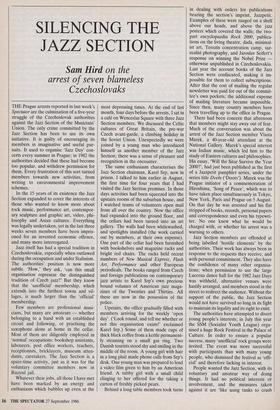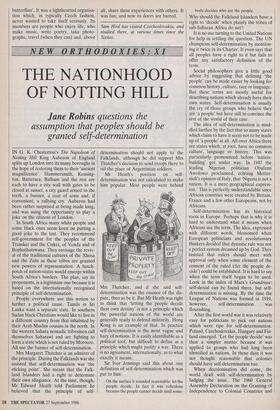SILENCING THE JAZZ SECTION
Sam Hird on the
arrest of seven blameless Czechoslovaks
THE Prague arrests reported in last week's Spectator are the culmination of a five-year struggle of the Czechoslovak authorities against the Jazz Section of the Musicians' Union. The only crime committed by the Jazz Section has been to use its own initiative. It is guilty of encouraging its members in imaginative and useful pur- suits. It used to organise 'Jazz Day' con- certs every summer in Prague; in 1982 the authorities decided that these had become too popular, and withdrew permission for them. Every frustration of this sort turned members towards new activities, from writing to environmental improvement schemes.
In the 15 years of its existence the Jazz Section expanded to cover the interests of those who wanted to know more about rock music, performance art, contempor- ary sculpture and graphic art, video, phi- losophy and Asian cultures. Everything was legally undertaken, yet in the last three weeks seven members have been impris- oned for an invented economic offence, and many more interrogated.
Jazz itself has had a special tradition in Czechoslovakia, especially when outlawed during the occupation and under Stalinism. The authorities' position is now more subtle. 'How,' they ask, 'can this small organisation represent the distinguished tradition of Czech jazz?' But they know that the 'unofficial' membership, which extends into the furthest towns and vil- lages, is much larger than the 'official' membership.
Few members are professional musi- cians, but many are amateurs — whether belonging to a band with an established circuit and following, or practising the saxophone alone at home in the cellar. Most of them are diligently employed in `normal' occupations: bookshop assistants, labourers, post office workers, teachers, receptionists, bricklayers, museum atten- dants, caretakers. The Jazz Section is a spare-time activity, just as it was for the voluntary committee members now in Ruzyne jail.
Whatever their jobs, all those I have met have been marked by an energy and enthusiasm which bubbles up even at the most depressing times. At the end of last month, four days before the arrests, I sat in a café on Wenceslas Square with three Jazz Section members. We discussed the Celtic cultures of Great Britain, the pre-war Czech avant-garde, a climbing holiday in the Soviet Union. Unexpectedly we were joined by a young man who introduced himself as another member of the Jazz Section; there was a sense of pleasure and recognition in the encounter.
The same enthusiasm characterises the Jazz Section chairman, Karel Srp, now in prison. I talked to him earlier in August, the first time for four years that I had visited the Jazz Section premises. In those days activities had been squeezed into the upstairs rooms of the suburban house, and I watched teams of volunteers open mail from all over the country. Now the office had expanded into the ground floor, and the cellars had been turned into an art gallery. The walls had been whitewashed, and spotlights installed (the work carried out by members, at their own expense). One part of the cellar had been furnished with bookshelves and magazine racks and bright red chairs. The racks held recent numbers of New Musical Express, Flash Art, Performance and other European periodicals. The books ranged from Czech and foreign publications on contemporary jazz artists to Karel Srp's own precious bound volumes of American jazz maga- zines of the Twenties and Thirties. All these are now in the possession of the police.
Upstairs, the office gradually filled with members arriving for the weekly 'open day'. (Took round, and tell me whether or not this organisation exists!' exclaimed Karel Srp.) Some of them made cups of thick black coffee from a kettle permanent- ly steaming on a small gas ring. Two Danish tourists stood shy and smiling in the middle of the room. A young girl with hair in a long plait made phone calls from Srp's desk. One young man was prepared to lend a video film given to him by an American friend. A tubby girl with a small child clinging to her offered for the taking a carton of freshly picked pears.
Behind a long table members took turns in dealing with orders for publications bearing the section's imprint, Jazzpetit. Examples of these were ranged on a shelf above our heads, and above the jazz posters which covered the walls; the two- part encyclopaedia Rock 2000, publica- tions on the living theatre, dada, minimal- ist art, Terezin concentration camp, sur- realist photography, and Jaroslav Seifert's response on winning the Nobel Prize otherwise unpublished in Czechoslovakia. Last year the account books of the Jazz Section were confiscated, making it im- possible for them to collect subscriptions. After that the cost of mailing the regular newsletter was paid for out of the commit- tee's own pockets; the additional expense of mailing literature became impossible. Since then, many country members have been travelling up to the office in Prague.
There had been concern that afternoon that members might stay away out of fear. Much of the conversation was about the arrest of the Jazz Section member Vlasta Marek, a 40-year-old attendant at the National Gallery. Marek's special interest was Indian music, which led him to the study of Eastern cultures and philosophies. His essay, 'Will the Sitar Survive the Year 2000?', had just been published as the first of a Jazzpetit pamphlet series, under the series title Dye& (Doors). Marek was the Prague initiator of a commemoration of Hiroshima, 'Song of Peace', which was to have taken place simultaneously in Tokyo, New York, Paris and Prague on 5 August. On that day he was arrested and his flat stripped of books, records, personal papers and correspondence and even his typewri- ter. No one knew what he would be charged with, or whether his arrest was a warning to others.
Jazz Section members are offended at being labelled 'hostile elements' by the authorities. Their work has always been in response to the requests they receive, and with personal commitment. They also have the confidence of many other organisa- tions; when permission to use the large Lucerna dance hall for the 1982 Jazz Days was withheld, alternative venues were hastily arranged, and members stood in the street to redirect the audience. Without the support of the public, the Jazz Section would not have survived so long in its fight to maintain its legality and its right to exist.
The authorities have attempted to divert young people's interests; in July this year the SSM (Socialist Youth League) orga- nised a huge Rock Festival in the Palace of Culture. In order to ensure a popular success, many 'unofficial' rock groups were invited. The event was more successful with participants than with many young people, who dismissed the festival as 'offi- cial' and therefore lacking in interest.
People wanted the Jazz Section, with its voluntary and amateur way of doing things. It had no political interests or involvement, and the measures taken against it are 'like using tanks to crush butterflies'. It was a lighthearted organisa- tion which, in typically Czech fashion, never wanted to take itself seriously. Its members are people who enjoy life, who make music, write poetry, take photo- graphs, travel (when they can) and, above all, share these experiences with others. It was fun; and now its doors are barred.
Sam Hird has visited Czechoslovakia, and studied there, at various times since the Sixties.



























































 Previous page
Previous page